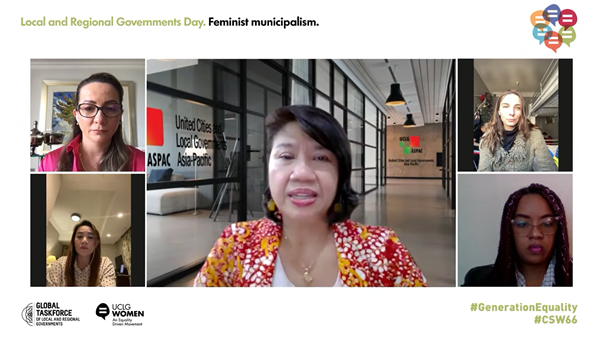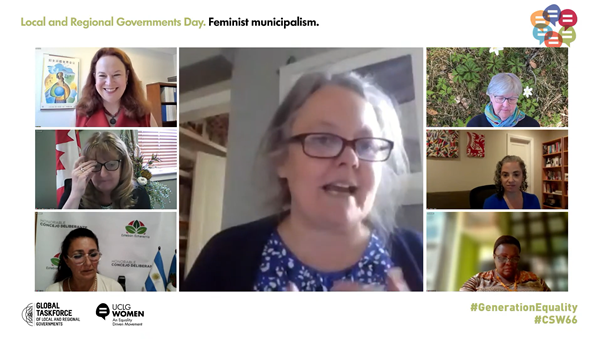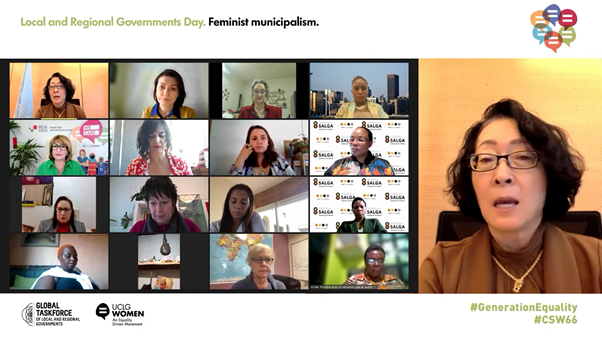CSW66 LRG Day: the time for feminist local leadership is now
05.04.2022
On Friday March 18th, a powerful gathering of local and regional governments, their associations and partners came together for the Local and Regional Governments Day, organised by United Cities and Local Governments (UCLG) on behalf of the Global Taskforce of Local and Regional Governments in the context of the sixty-sixth session of the UN Commission on the Status of Women (CSW66).
Entitled “Feminist municipalism: empowering women local leaders as a pathway for the achievement of the SDGs” the day showcased the strength and solidarity of the Feminist Municipal Movement, highlighting the key role of gender-sensitive, feminist approaches in local governance to ensure climate crises can be equitably navigated and Agenda 2030 can be achieved.
The strong participation of 300 registrants and over 40 panelists, including nearly 30 local political leaders from around the globe, local government associations, representatives from sister networks such as the Commonwealth Local Government Forum (CLGF), ORU FOGAR, and Regions4 as well as important participation from the international system with representatives from UN Women, and civil society, like Public Service International (PSI), Huairou Commission, and the Women and Habitat Network of Latin America and the Caribbean only reinforced the conviction that the time for feminist local leadership is now.
Feminist Municipalism and the Global Agendas

The first session, Feminist Municipalism and the Global Agendas, was opened by Madelaine Y. Alfelor-Gazman, Mayor of Iriga and UCLG Governing Co-President who stressed that, “through centuries of inequality, we have learned that an approach to politics in which we all count, where we are all empowered, will be rooted in care and it will transform governance, leadership and policy-making”. With the facilitation of Bernadia Tjandradewi, UCLG-ASPAC Secretary General, panelists went on to illuminate their own understandings of the topic. Paula Vargas Ramírez, Mayor of San José, highlighted the value of solidarity over competition, while Councilor Stephanie Tan, Catbalogan called for policymakers to institutionalise holistic gender policy action.
Buch City Councilor, Iryna Yarmolenko, cautioned that the protection and advancement of minority rights risks being left aside in times of conflict, as she highlighted the struggles of women and children in the war in Ukraine: “We used to discuss gender equality in our cities, with plans, policies, and gender months. Now it’s all focused on action: to save lives and relieve suffering. We need more women leaders and leaders who celebrate democracy and peace.”

Pilar Díaz, Mayor of Esplugues de Llobregat, emphasised that feminist municipalism is key to ensuring cities are designed for all, and Quito Vice Mayor, Gissela Chalá, called for the need to visibilise the system that creates vulnerability for the courageous women who are building public policies based on care while working for a world free from violence, machismo, and discrimination.
SDG5 in review: the role of local and regional governments
The second session, co-organised with CLGF, SDG5 in review: the role of local and regional governments, is of particular relevance with the Goal under review at the 2022 High-Level Political Forum (HLPF). As facilitator, CLGF Secretary General, Lucy Slack, challenged panelists to find ways to ensure that our policies take an intersectional approach. Carola Gunnarsson, Mayor of Sala, SALAR Vice-President, and Vice-President of UCLG for Europe stressed that gender equality is a cornerstone of democratic, peaceful societies.

Joanne Vanderheyden, President of the Federation of Canadian Municipalities and Mayor of Strathroy-Caradoc, Analía Pérez, President of the Deliberative Council of the Municipality, Esteban Echeverria, Councillor, Heather Brannan-McVey, North Lanarkshire, and UN Women’s Sabine Fraiser reiterated that women’s representation in local governments and decision-making must be central to solutions, with quotas and data as valuable tools. Occidental College Associate Professor, Jennifer Piscopo, shared a gender-sensitive, multi-sectoral approach to local policymaking, while UCLG-UBUNTU Advisor, Ana Falú and Huairou Commission Chair, Violet Shivutse, drew attention to a shared vision of local, caring communities, and feminism as a new way of doing politics.
Empowering women and girls for caring and resilient cities and territories
The Day’s final two sessions took place within the context of the CSW NGO Forum’s official programme. Entitled, Empowering women and girls for caring and resilient cities and territories, the third session was facilitated by Emilia Saiz, UCLG Secretary General. Mami Mizutori, Special Representative of the UN Secretary-General for Disaster Risk Reduction, highlighted that, as governments at the frontline of the climate emergency, municipalities can find strength in the feminist leadership.

As the first woman Mayor of Johannesburg, Mpho Phalatse shared that diversity is a key asset in cities, and should be embraced. Rohey Malick Lowe, Mayor of Banjul, called for the inclusive climate responses which reinforce the public and political participation of women, migrants and persons with disabilities. Rosa Pavanelli, Secretary General of Public Service International, drew the link between green jobs and care jobs, and LRGs’ role in promoting these; Marta Mazurek, City Councillor of Poznan and Sandy Schilen, Executive Director, Huairou Commission highlighted the value of local feminist leaders working hand-in-hand with youth councils and grassroots organisations.
Laure Baflan Donwahi, President of the Association of Women of Nawa representing the Regional Council of Nawa and Mayor Carla Andrea Amtmann Fecci, of Valdivia, discussed the need for LRGs to create frameworks, resources and legal structures to enable women’s access to opportunities. Tours Deputy Mayor, Elise Pereira-Nunes then considered the need for disaggregated data and gender-sensitive finances and policies. Former UN Special Rapporteur in the field of Cultural Rights, Farida Shaheed, reminded of the need for a fundamental shift in developmental models, towards a system of care.
Fostering gender equality and climate action through sustainable urban mobility
The final session of the Local and Regional Governments’ Day, Fostering gender equality and climate action through sustainable urban mobility, was co-organised with UITP, and opened by their Secretary General, Mohamed Mezghani. The Mayor of Montevideo, Carolina Cosse and Director of the Institut Català de les Dones, Neus Pociello, both spoke to how cities are not ‘neutral’, but rather that everything from planning to transport to climate change are experienced in gendered. Inés Sánchez de Madariaga, Chair of the Advisory Group on Gender Issues to the UN-Habitat Executive Director, highlighted this in terms of the ‘mobility of care’.
Laura Shoaf, CEO, West Midlands Combined Authority, Laura Ziliani, Advisor to the Director of Strategic Planning, Buenos Aires, and Marco Berger, Director of Planning, Jalisco shared perspectives on governing through a gender perspective and attention to safety. Maite Rodriguez Blandon, from the Women and Habitat Network of Latin America and the Caribbean shed light on indigenous women’s experiences of discrimination when accessing transport and care services. Bongile Mbingo, Mayor of Ezulwini, zoomed out to the challenge of creating resilient territories for all.
The power of the Feminist Municipal Movement
The day’s active participation and diversity of inputs, both in terms of content and regions, illustrated the conviction of the local and regional government constituency in the power of the Feminist Municipal Movement and the importance of women in feminist leaders in transforming our societies and ensuring no one is left behind. Looking towards future international policy processes in 2022, the Feminist Municipal Movement will continuee to gather to ensure that gender equality and the empowerment of women are at the center of sustainable development agendas. UCLG Secretary General, Emilia Saiz, brought the ceremonies of the dynamic and fruitful day to a close, reflecting that it is resoundingly clear that the feminist municipal movement remains committed to working together and building a caring, joyful and equitable future for all.